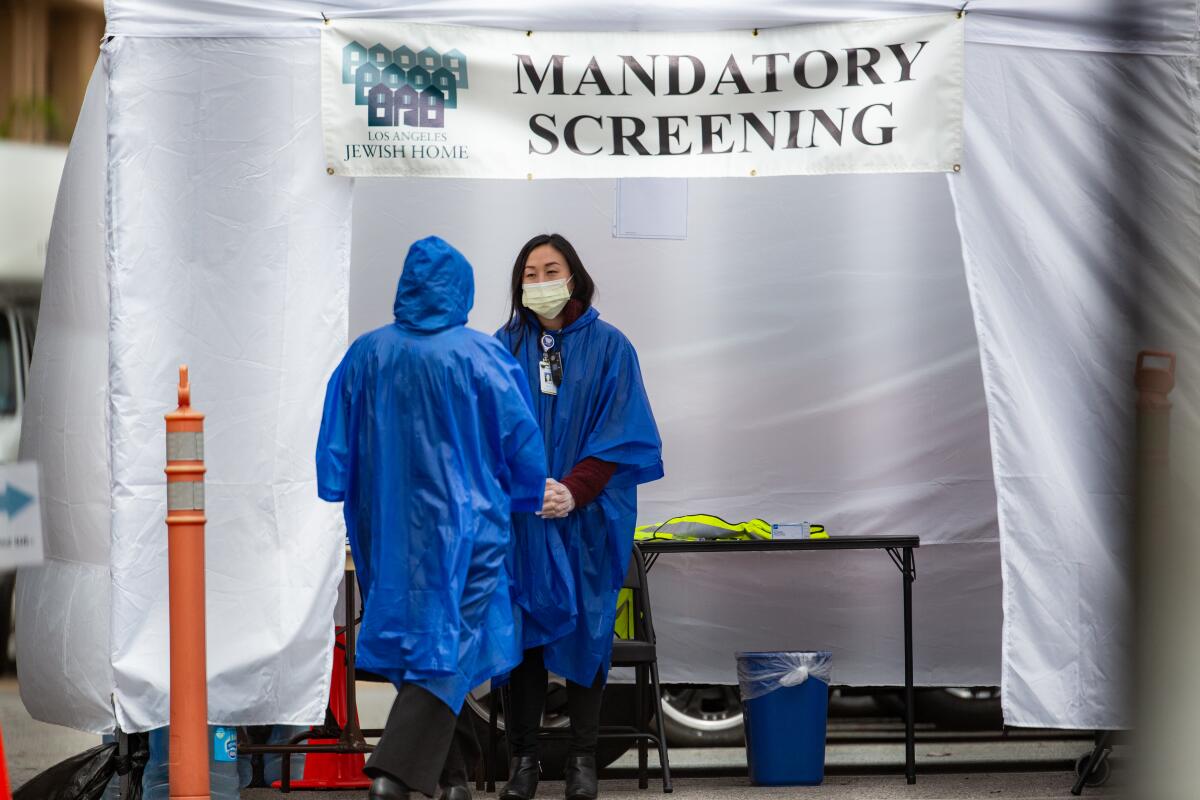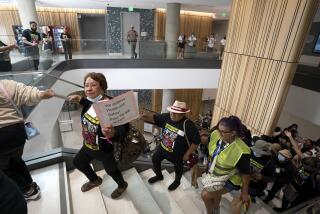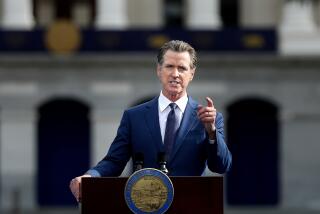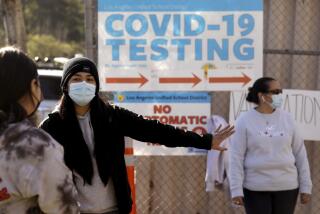After Times investigation, Newsom says nursing home inspectors will be tested for coronavirus

- Share via
California Gov. Gavin Newsom announced Friday that the state will start an aggressive COVID-19 testing regime for its health employees who inspect nursing homes.
The announcement came hours after publication of an L.A. Times investigation that found since the beginning of the pandemic, the state health department had been sending inspectors from nursing home to nursing home without testing them for the deadly virus, which means they could be spreading it.
“We’re raising our standards,” Newsom said during a news conference, adding that nursing home inspectors will be held to the same testing standards the state requires of nursing home employees. Homes are required to test 25% of their staff every week and ensure that all employees are tested at least once a month.
“I am thrilled to see this put into place,” said Dr. Michael Wasserman, medical director of the Eisenberg Village nursing home in Reseda and an outspoken proponent of universal, routine testing of nursing home residents and employee to help contain the disease. “I think it will save lives.”
Nursing homes have been ground zero for the pandemic in the United States, suffering a staggering proportion of the deaths from COVID-19. As of Monday, nearly 3,000 nursing home residents and more than 100 staff had died of COVID-19 in California, accounting for nearly 40% of the deaths statewide.
Many nursing home outbreaks are believed to have been sparked by “asymptomatic spread,” in which people who do not know they have the virus unwittingly infect others.
State inspectors worry they could be unwittingly spreading coronavirus from nursing home to nursing home while doing their jobs.
Eight registered nurses working as inspectors for the California Department of Public Health — all of whom spoke on condition of anonymity for fear of retaliation — told Times reporters they weren’t being tested. One said she came down with a bad cough and tested positive for COVID-19 soon after visiting more than a dozen nursing homes in two days.
“For them to send us in without testing or screening is unconscionable,” said an inspector in Southern California. “I think nursing homes shouldn’t let us in.”
Most of the inspectors interviewed also said they have not been provided with properly fitting personal protective equipment. One inspector said she refuses to spend more than a few minutes in a nursing home’s “red zone,” the quarantine wing reserved for COVID-positive residents, because every time she exhales wearing her ill-fitting masks, her glasses fog up.
In his announcement Friday, Newsom indicated that state officials would need to meet with the union representing the inspectors to work out details of the testing program.
Tony Owens, vice president of the union, said he supports robust testing. He stressed the need to “prioritize the protection of these people.” He called it “a matter of health and safety.”
“The governor was compelled to say, ‘We will be testing,’” Owens said. “Just the fact that he said that means we’ve obviously gotten traction there.”
Since the beginning of the pandemic, California health officials have required nursing homes to bar entry to outsiders who might bring the coronavirus in with them and trigger a deadly outbreak among the elderly residents.
As a result, aging parents haven’t seen their families in months. Many have died without a final embrace from the people they loved.
“It makes basically no sense that we’ve locked these facilities down since March, keeping families out, only to learn inspectors have been moving from facility to facility without being tested,” said David Grabowski, a professor of healthcare policy at Harvard Medical School.
More to Read
Sign up for Essential California
The most important California stories and recommendations in your inbox every morning.
You may occasionally receive promotional content from the Los Angeles Times.














